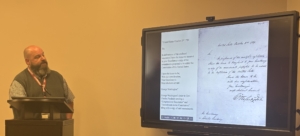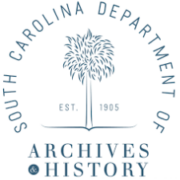Dept. of Archives Gives Tips to Municipal Clerks About Record Keeping; Documents Like George Washington’s Letter Date Back to 1700s
“Sir, in deliverance of the enclosed resolution I have the honor to transmit to your Excellency a copy of the amendments proposed to be added (to) the Constitution of the United States. I have the honor to be, with due consideration, Your Excellency’s most obedient servant,” signed President George Washington.
What if George Washington’s letter to South Carolina Governor Charles Pinckney Oct. 2, 1789, referring to a copy of the Bill of Rights had been lost or thrown away?
Nobody would know today that it ever existed, and a piece of history would have been lost. But this letter, written in cursive, was saved and now resides in the S.C. Department of Archives and History.
Today, hundreds of records exist in cities and towns that must be kept either permanently or at least temporarily and it’s a big job for municipal office personnel.
Chris Condon, Local Records Analyst with the S.C. Department of Archives and History (SCDAH), gave a presentation on records management to municipal clerks at a lunch meeting last week at Upper Savannah Council of Governments.
His PowerPoint presentation displayed some centuries-old documents and then covered the definition of what is considered a public record. It also featured retention schedules, storage requirements, and destruction reporting procedures.
One “memo” created in 1788 and signed by the 12 justices of the Court of Abbeville County to the inhabitants of the Indian town of Nolichucke, N.C., complained of the murder of Cherokee Indians and warned that “such aggressions must stop or (else) endanger the peace.”
“I would say that in 1788, this had administrative value,” Condon said, with a smile. “But now it has historical value. That’s why we keep public records.”
He said any government entity which receives public funding (taxes) is required to retain records.
“Public records are the public’s business,” Condon said. “Public bodies create public records.”
Records referring to land ownership, grant projects, business licenses, building permits, council minutes, audit reports, budgets, resolutions, cemetery deeds, etc., must be kept permanently. Retention methods include official paper copies, microfilm and digitation.
Other records such as business license applications, paid invoices, receipts, bids submitted by vendors, etc., can be disposed of (made unretrievable) after a certain time, according to retention schedules available on the SCDAH website. Municipalities or agencies must send documentation (an ARM-11 form) of records destruction to SCDAH.
Storage requirements include having a well-maintained area free of food, drink or vermin, well-ventilated, no extreme temperature fluctuations; no leaks, flooding of excessive moisture, with everything at least three inches above the floor.
“You’re not going to be able to guarantee 100 percent safety of your records. It’s not possible. But make every effort to,” Condon said.
He recommended keeping records not necessarily chronologically but “like records with like records” because some are permanent and some can be destroyed. And document or catalogue records so they are easier to find, he said. If you are keeping records digitally, Condon said to keep backup copies offsite.
“It’s just as important to know what you don’t have as what you do,” Condon said while suggesting keeping copies to document legal disposition of records. “If you know what you don’t have, you don’t have to spend hours going through all your records trying to find it.”
Condon told the clerks he knows record keeping is a big job.
“Nobody will ever truly understand what you do,” he said of the general public. “They are going to go, ‘oh, she just keeps the records.’ They don’t care what you have to go through to do it. But when you are able to pull that file up and hand it to them, they’re like that is ‘awesome.’”
He said when items are recorded for the first time, “they had an official purpose. Now people are using that to trace their lineage. The most important thing we do is protect South Carolina’s history.”
A public administrator’s meeting will be held Thursday, August 21 beginning at noon at the USCOG office in Greenwood. Staff members from the State Energy Office (SEO) have requested to make a short presentation on potential grant funding opportunities.
The SEO serves as the principal energy planning entity for South Carolina, through which they offer initiatives focused on energy efficiency, renewable energy, and clean transportation, including funding opportunities, technical assistance, and education, outreach, and training.
Below, Department of Archives Local Records Analyst Chris Condon reads letter from President George Washington to S.C. Governor Charles Pinckney Oct. 2, 1789.




